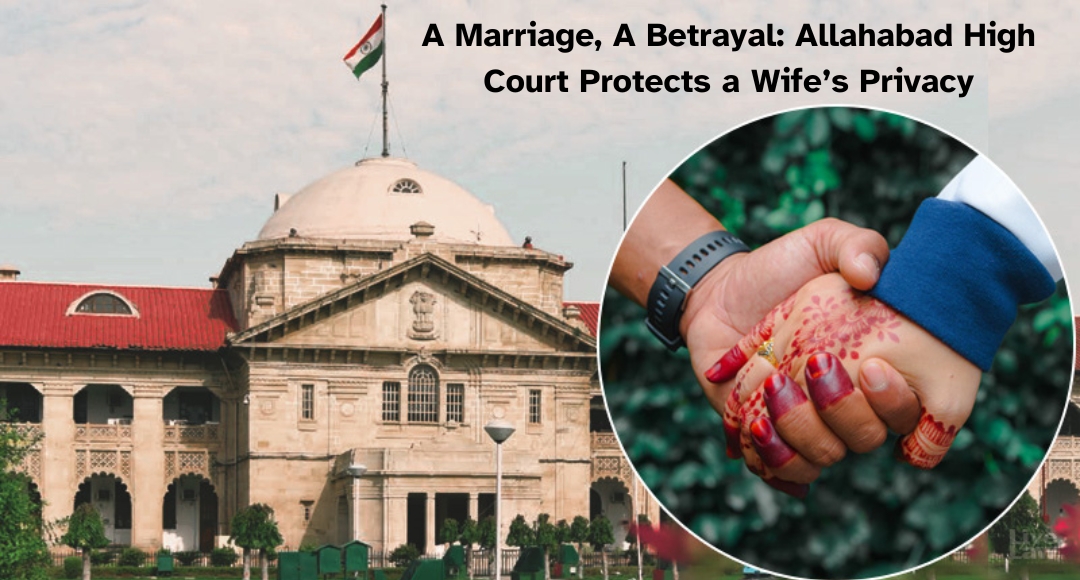In an age where privacy is becoming an increasingly precious commodity, the Allahabad High Court has delivered a powerful judgment reaffirming the sanctity of privacy and individual autonomy, even within the confines of marriage. This case involved a man who was accused of breaching his wife’s trust most severely by secretly recording an intimate video and uploading it on Facebook. The Court’s decision is a reminder that marriage is not an all-powerful bond that can strip away the basic rights of a partner. Instead, it’s a relationship built on trust, respect, and mutual understanding, and it should never be used as an excuse to violate one’s privacy.
The Case That Stunned the Allahabad High Court
The accused, a husband, had sought to quash criminal proceedings against him, arguing that, as the legally wedded husband of the complainant, he should not be held liable for uploading the video. He claimed that there were no substantial grounds to prove that he had recorded or uploaded the video, and hinted that the matter could be settled through reconciliation. However, the Court took a strong stance on the matter, emphasizing that the seriousness of the allegations could not be brushed aside.

The prosecution presented compelling arguments, revealing that the husband had secretly recorded an intimate act between the couple and uploaded it to Facebook without the wife’s knowledge or consent. Furthermore, the video had been shared with the wife’s cousin and other villagers, making it clear that the husband’s actions were not just a breach of trust, but a violation of the privacy of the woman he vowed to protect and cherish.
A Strong Defense of Privacy and Dignity
Justice Vinod Diwakar, in his ruling, clearly rejected the notion that this issue could be resolved through compromise. He stated that the breach of trust in this case was far-reaching, as it deeply impacted the dignity and autonomy of the complainant. The Allahabad High Court explained that marriage does not give a husband control over his wife’s body, actions, or privacy. Rather, a wife is an individual with her rights, desires, and agency. She has the right to feel secure in her relationship, without the constant fear that her most private moments could be exploited. The Court also stressed that marriage should be about honouring the trust placed in each other. The relationship between a husband and wife is supposed to be one of mutual respect, where both partners feel safe, valued, and respected. Violating this trust by sharing intimate content in such a manner is not just a legal breach but a moral failure. The judgment serves as a reminder that privacy is a basic human right, and no matter the relationship, it should always be respected.
A Call for Justice and Equality
This judgment is a testament to the importance of upholding personal dignity and the autonomy of every individual, irrespective of their relationship status. It is a bold step in the right direction, emphasizing that the law must protect the rights of women and ensure that their voices are heard and respected. The Allahabad High Court decision not only highlights the seriousness of privacy violations but also reminds us that, in a healthy relationship, both partners are entitled to their autonomy, trust, and respect. In a world where digital privacy is often taken for granted, this case sends a strong message that violating someone’s personal space, especially when it comes to intimate moments, is not only a crime but a betrayal that cannot be excused. The Allahabad High Court made it clear that the gravity of such offences cannot be overlooked or mitigated with the hope of reconciliation.

Upholding What’s Right
As we move forward, it’s crucial to remember that privacy and autonomy should never be compromised, no matter the context. The Allahabad High Court ruling stands as a powerful reminder that trust and respect in marriage are non-negotiable. In protecting one’s right to privacy, we are not just safeguarding the individual but fostering a society where relationships are based on equality, mutual respect, and fairness.
Disclaimer: This article is intended for informational purposes only. The views expressed here are based on publicly available legal documents and interpretations of the case. Always seek professional legal advice for specific concerns or situations.
Also Read:
Evolution and Scope of Administrative Law
Supreme Court Slams Overpriced Lawyers: Justice Must Be Accessible to All






